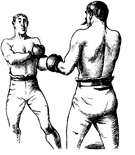
Gang Members: Their Street Education
HARVARD DIARY
In recent years I’ve become much connected to some black ministers in Boston, as well as to some youth workers who are white and black — all of whom are trying to connect with youngsters who have dropped out of school, who are gang members, and who more than flirt with law-breaking (violence, drug dealing) as a way of life. My youngest son, now only recently out of college, was the one who first helped me meet such young people — he had done volunteer work with them: taught in a program aimed at school dropouts, at children dismissed from the public schools as “unmanageable,” as “violent,” as “severely disturbed.” I had become quite worried about my son, not the boys and girls he was getting to know: What could he, a mere college student, do to be of help to such stubbornly disinterested students, almost all of them black — and not least, I have to add, what might happen to him as he ventured into neighborhoods regarded as beyond the pale, alas, by so many people in the Boston metropolitan region?
My son came back to his dormitory, and to our home, with stories of fear and danger, sometimes, but also of sadness and frustration: How to work with youths defiantly uninterested in education? He would try exhortation, not often to any effect. He would try intense efforts at engagement, personal and intellectual, not often to any effect. He would try a kind of crude pragmatism, or a more elevated version of espoused practicality — not often to any effect. These boys and girls shrugged their shoulders, turned their faces away, as he recited moral truisms and educational pieties, as he tried to establish working involvements or alliances, as he spoke of the economic and social possibilities that literacy and diplomas can offer young people. Finally, in desperation, he tried to put aside for a while his urgently felt need to tutor, to educate children much in need of learning, and instead sought some, any common ground: things to discuss and, even more important, things to do that would keep him somehow in touch with “them” (what he realized those boys and girls had become to him, a collective “other,” alien, frustratingly hard to figure, never mind reach and influence).
I still remember my son Michael’s accounts of what he called “progress” — some conversations with youths as he played basketball with them, as he taught them hockey in a rink. They had inquired about his life — his interests and hobbies. He had told them what he was doing — his activities, his course of study. He had managed to go further, mention what he hoped to be doing in the future — a career in medicine. One of the boys, at age 10 a “runner” for a big-time drug dealer, asked how one becomes a doctor. Mike responded with information in a matter-of-fact way — even as the two of them shot baskets. A week later, the boy was interested enough to bring the subject up, ask more questions — while all the time insisting that school, any kind of school, was simply not for him. Two months later, though, Michael had shown this boy a hospital, introduced him to some doctors and nurses, explained to him how various clinics work — their purposes, the kinds of people who come to them. Gradually, the boy began to turn toward schooling, as Michael presented it to him — a book they looked at together, some newspapers and magazines they jointly read. Finally, Michael volunteered to do some explicit tutoring in English and math, and the offer was accepted, though with hesitation. A later summary description by my son went like this: “It took three months of being challenged, tested, doubted, put in my place, before we could even begin to work together academically.”
You May Also Enjoy
Today we act as if the only kind of remorse we really know is unconscious, a response of the imagination.
The opening struggle for a New Jerusalem is naturally beyond anyone’s ken. A novelist, perhaps alone among us, has the capacity to make compelling guesses.
We owe each other tact, discretion, the right of individuality — and a consideration of what kind of public values, what kind of larger social and cultural scene, we want.

